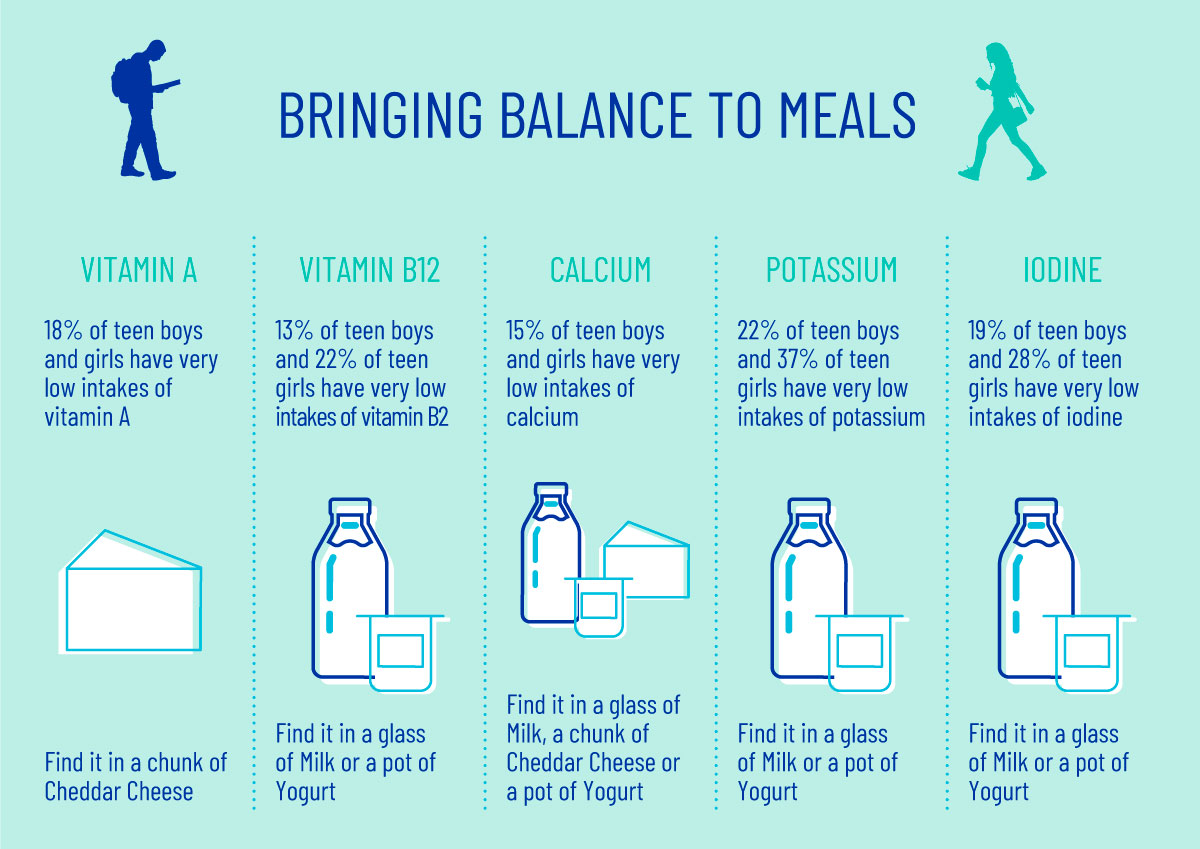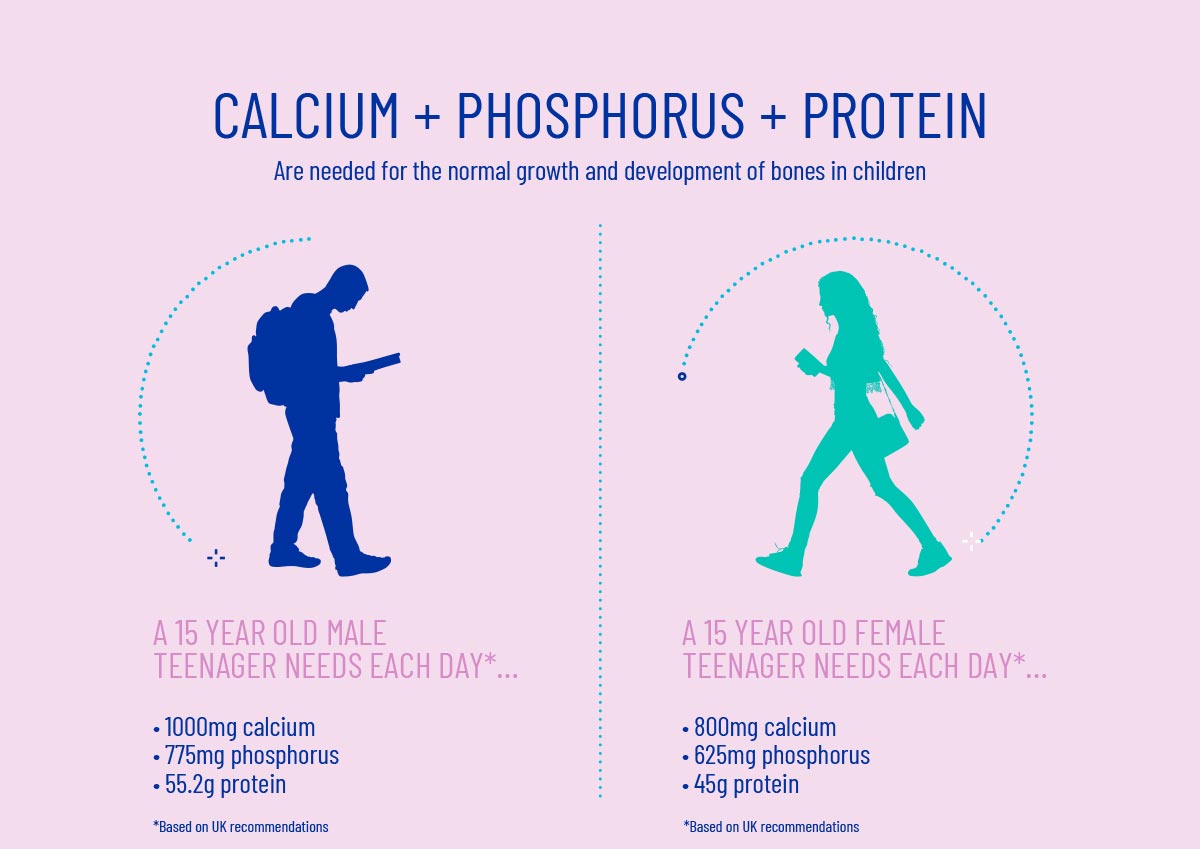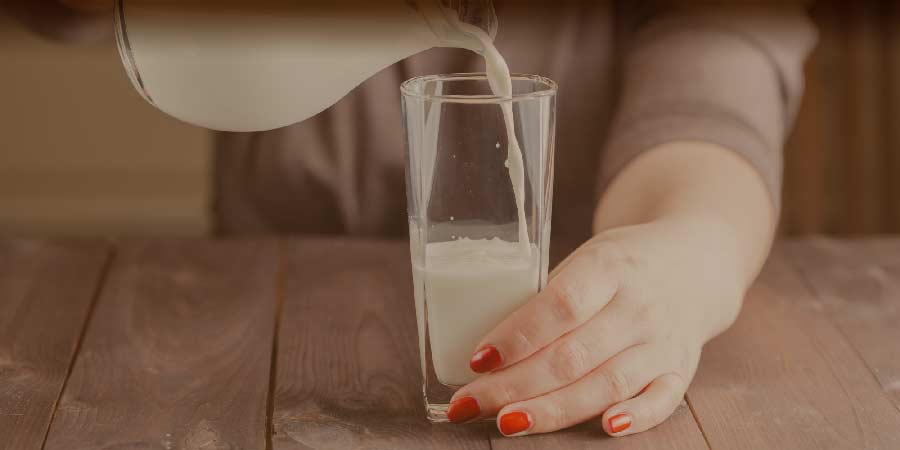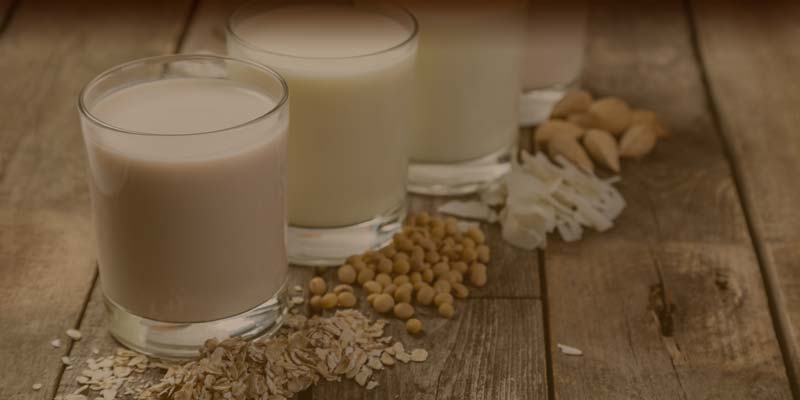With so many new experiences to enjoy and the start of a journey towards independence, eating a healthy, nutritious diet is usually low on the list of priorities for teenagers. Yet it’s a stage in life when children are growing rapidly and often have higher needs for certain nutrients than at any other time of life.
BRINGING BALANCE TO MEALS
The teen years are a time when parents often start to have less control over their children’s eating habits. Teenagers begin to eat more food away from home, have a bigger say in family meal choices and often snack more on foods that are high in fat, sugar and/or salt but low in other nutrients. At the same time, some teens may start to skip meals, experiment with vegetarian diets, eliminate food groups such as meat, dairy or carbs, or closely monitor what they’re eating to control their weight or bulk up. The end result can be very unbalanced diets – often with too much saturated fat, sugar and salt but too little fibre, a lack of fruit and veg and not enough vitamins and minerals during this time of rapid growth.
The combo of little interest in nutrition, together with high nutrient needs, means the teen years are one of the main times in life when nutrients are most likely to be lacking in diets. Indeed, studies suggest intakes of some key vitamins and minerals are worryingly low, increasing the risk of deficiencies that may impact on health in the teen years but also later in life. Dairy products provide many of the nutrients that are often missing.

GETTING THE BALANCE RIGHT
Dairy products are an important part of a healthy, balanced diet and are especially great choices for teenagers. Here are some of the benefits thanks to the nutrients found in dairy…
They’re great for active teens
Milk, cheese and yogurt are rich in protein, and protein helps us maintain muscle mass. They also contain other nutrients that can help us get the most out of our workouts such as calcium and potassium, which are needed for normal muscle function. Plus, milk makes a great drink after exercise to help replenish the fluids and electrolytes lost during through sweating.
Skin Health
Dairy products contain two nutrients that are important for our skin – vitamin A in cheese and iodine in milk and yogurt.
Fuel for your day
A whirlwind of schoolwork, after school clubs and hanging out with friends can take its toll on energy levels. Getting enough sleep is the main solution but several B vitamins found in some dairy products help to release energy from food and reduce tiredness and fatigue, making them great choices.
They’re convenient
Busy teen lifestyles can mean food and mealtimes are low down the list of priorities. Dairy products come to the rescue as they can be transformed into quick meals in minutes. A bowl of cereal with sliced banana and milk takes seconds to prepare – and compared with skipping breakfast will give teens more energy and help them concentrate better in class.
They make great snacks
Many popular snacks are packed with fat, added sugars and/or salt but few nutrients. Snacks based on dairy products are versatile and can provide nutritious alternatives to suit every tastebud. From a homemade banana milkshake or smoothie bowl to cheese on crackers or a homemade tzatziki dip with pepper sticks, there’s plenty of tasty ways to do dairy.
They’re great for vegetarian and flexitarian diets
Dairy products provide vitamin B12, which is only found naturally in animal foods. This means dairy products are an especially important source of this nutrient for people who follow vegetarian diets and don’t eat meat or fish. It’s important we get enough vitamin B12 as it’s needed for our immune and nervous systems to work normally. Plus, dairy products are important sources of high-quality protein in vegetarian diets. Unlike most plant proteins, milk, cheese and yogurt provide all the essential amino acids (or building blocks) that we need to build protein. These can’t be made by our bodies so we have to get them from the food we eat.
Support for brain health
Dairy products provide several nutrients that can help support our brains, especially important when we’re learning, taking exams and using a lot of brain power! The first is iodine. It’s not a nutrient we hear much about but iodine is essential for all the mental activities that affect our attention, memory and language, as well as our ability to think, make decisions and problem solve – it’s what experts call cognitive function. Milk, cheese and yogurt are the main providers of iodine in the UK diet. Studies show 19% of teen boys and 28% of teen girls have very low intakes of iodine and so would benefit from more.
UK guidelines recommend 130mcg (that’s micrograms) iodine a day for 11 to 14 year olds and 140mcg iodine a day for 15 to 18 year olds:
- 200ml semi-skimmed milk = 62mcg iodine. A glass of milk provides 48% of a 11-14 year olds, and 44% for 15-18 year olds, recommended intake
- 150g pot low-fat fruit yogurt = 72mcg iodine. This provides 55% of a 11-14 year olds, and 51% of a 15 to 18 year olds, recommended intake
As well as iodine, vitamin B1 (found in yogurt) and vitamin B12 (found in milk, cheese and yogurt) affect our psychological function – in other words, our emotions, behaviour, ability to be social and our overall mental health. Vitamin B5 (found in milk), also contributes to normal mental performance.
Good news for waistlines
There’s no need to worry about the fat or calorie content of dairy foods! There are plenty of lower-fat options available including semi-skimmed, 1% fat and skimmed milk, as well as low-fat yogurt and reduced-fat cheeses. These contain all the calcium but fewer calories.
Supporting smiles
There’s a reason to ‘smile and say cheese’ and it goes beyond just looking good on Insta, Snapchat or Tiktok. Dairy products contain calcium and phosphorus – two nutrients important for maintaining teeth. They’re also good choices to have in place of foods and drinks that contain a lot of sugar – hard cheese, for example, is sugar free. Plus, milk is a nutritious and tooth-friendly drink – unlike many soft drinks, it doesn’t have any added sugar and contains protein, vitamins and minerals that help keep us healthy.
Healthy Bones
Dairy products – milk, cheese and yogurt – are important sources of calcium, phosphorus and protein, which are all needed for the normal growth and development of bones during childhood and the teenage years. During this time, our bones grow rapidly in length and strength and large amounts of calcium are deposited in them. That’s why teenagers need more calcium than at any other time in life
By the time girls are 18 years old and boys 20 years old, around 90% of bone strength and density has already been achieved. Our bones keep growing and strengthening until around our late 20s, when they are at their thickest and strongest – known as peak bone mass. Then by our mid-30s, our bones start to lose calcium faster than they store it – and so gradually lose their strength. This is a normal part of getting older and it happens to everyone. The key is to make sure our bones are as strong as they can be at their peak. That’s why it’s so important to have a calcium-rich diet in our teens. Put simply, the more calcium that’s deposited in our bones during this time, the stronger our bones will be in later life.

Last reviewed: 03/2021
Next review due: 03/2023










